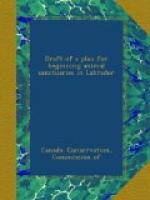An eagerly exploiting people in an easily exploited country, we are only too apt to live on the capital of all our natural resources. We are also in the habit of developing one thing at the expense of everything else connected with it. The value of these other things often remains unrecognised till too late. For instance, reckless railways burn forests which ensure a constant flow of water for irrigation, navigation, power plant, and fish, besides providing wood for timber and shelter for bird and beast. The presence of a construction gang generally means the needless extermination of every animal in the neighbourhood. The presence of mills means the needless absence of fish. And the presence of ill-governed cities means the needless and deadly pollution of water that never was meant for a sewer. The idea is the same in each disgraceful case. It is, simply, to snatch whatever is most coveted for the moment, with least trouble to one’s self, and at no matter what expense to Nature and the future of man. The cant phrase is only too well known—“Lots more where that came from”. Exploitation is destroying now what civilisation will long to restore hereafter. This is lamentably true about material things. It is truer still about the higher than material things. And it is truest of all about both the material and higher values of wild life, which we administer as if we were the final spendthrift heirs and not trustees.
Animal sanctuaries are places where man is passive and the rest of Nature active. A sanctuary is the same thing to wild life as a spring is to a river. In itself a sanctuary is a natural “zoo”. But it is much more than a “zoo”. It can only contain a certain number of animals. Its surplus must overflow to stock surrounding areas. And it constitutes a refuge for all species whose lines of migration pass through it. So its value in the preservation of desirable wild life is not to be denied. Of course, sanctuaries occasionally develope troubles of their own; for if man interferes with the balance of nature in one way he must be prepared to interfere in others. But all experience shows that an easily worked system will ensure a maximum of gain and a minimum of loss.
Up till quite recently Nature had her own animal sanctuaries in vast and sparsely settled lands like Labrador. But now she has none. There is no place left where wild life is safe from men who use all the modern means of destruction without being bound by any of the modern means of conservation. And this is nowhere truer than in Labrador, though the area of the whole peninsula is equal to eleven Englands, while, even at the busiest season along the coast, there is not one person to more than every ten square miles. Since the white man went there at least three-quarters of the forests have been burnt, and sometimes the soil burnt too. Wild life of all kinds has been growing rapidly less. The walrus is receding further




